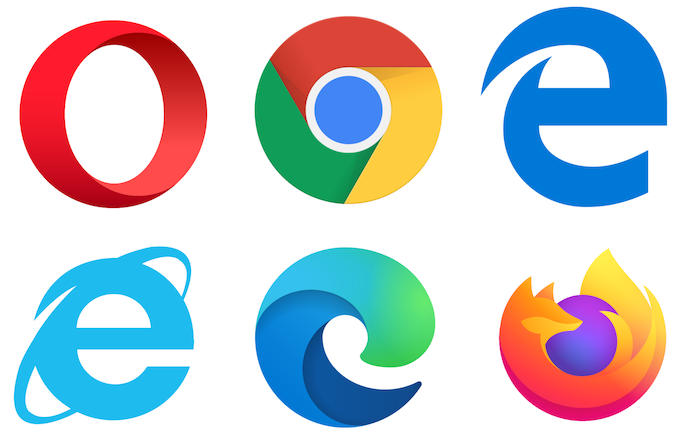The 2020 Browser Battle: Surfing With Speed
by Brett Howse on September 10, 2020 8:00 AM EST- Posted in
- Software
- Browsers
- Mozilla
- Google Chrome
- Microsoft Edge

Accessing the internet is one of the most basic tasks for any computer, but webpages in 2020 are incredibly complex so how the browser interprets the code and renders it as a viewable webpage is no simple task. Modern browsers have both a rendering or layout engine, as well as a scripting engine, and both factor into how well the browser can handle any particular task.
When the web first evolved, it was more or less a static affair, with webpages laid out in HyperText Markup Language, otherwise known as HTML, but as time passed websites became more and more complex, with it not uncommon today to run applications that would have been compiled programs several years ago. As such, browser performance is still an especially important metric for any PC user.
For 2020, the browser landscape has been shaken again, with Microsoft abandoning their closed source browser and moving over to the open source Chromium project, which as the name suggests, is the basis for the popular Google Chrome browser. After being in development for over a year, Microsoft has started updating Windows 10 PCs from Edge based on EdgeHTML to the Chromium Edge. As such, we figured it was a good chance to take stock of the browser landscape and see how some of the more popular browsers fare in terms of performance and battery life.
Although the web is based on HTML, with a standards body approving changes to the base HTML and therefore a level playing field, over the years it has never worked out quite as well as hoped, with web developers focusing on particular browsers that are popular or they are comfortable with, so over the years we have seen quite a few periods where specific browsers have been favored over others. Most readers will likely remember the days of Microsoft’s Internet Explorer 6 dominance, where websites would often only work in IE 6 thanks to heavy use of ActiveX. Internet Explorer has been a dominant feature of business and enterprise intranet sites, to the point where Microsoft is still forced to include and update their ancient browser even as they would like to move on. But that was certainly not the only time that has happened. Microsoft had the shoe on the other foot with the rise of mobile computing, where Webkit was the predominant browser thanks to Apple’s Safari browser on iOS, and Google using Webkit as the basis for Chrome as well.
What this means is that the web landscape, despite being open thanks to a standards body, has never felt as open as it could have been. One dominant platform or another has tended to be the one to drive developers to utilize new features that may not yet be ratified as web standards, or not yet supported by other browsers. So, although there is likely a group of people happy to see Microsoft abandon their own browser engine and move to Chromium, for the web it is not necessarily a net positive to see so much consolidation.
Today’s web landscape heavily favors browsers based on Chromium, which of course includes Google Chrome, but also the new Microsoft Edge, as well as Opera, Vivaldi, Brave, and quite a few more. Mozilla Firefox is the rare exception, with Mozilla developing their own browser engine in Gecko with Spidermonkey for scripting. Apple continues to offer Safari with Webkit, of which Chromium forked into Blink back in 2012.
| 2020 Web Browser Comparison | |||||
| Name | Rendering Engine | Scripting Engine | Version Tested | ||
| Google Chrome | Blink | V8 | 84 | ||
| Microsoft Edge Classic | EdgeHTML | Chakra | 18 | ||
| Microsoft Edge Chromium | Blink | V8 | 85 | ||
| Mozilla Firefox | Gecko | SpiderMonkey | 79 | ||
| Opera | Blink | V8 | 70 | ||
| Internet Explorer | Trident | Chakra (JScript) | 11 | ||
| Apple Safari | WebCore | JavaScriptCore | Not Tested | ||
Although each browser has their own advantages in terms of features, design, and privacy, today we are going to just focus on how each browser performs. When an application is run on your desktop, most of the time it is going to be code that is written, then compiled. On the web, the code is not compiled, and instead the browser relies on its ECMAScripting engine to perform Just-In-Time (JIT) compilation. Because of this, browser performance is heavily impacted by how that scripting engine performs. We have seen advances in the scripting engine improve browser performance over time, as well as sometimes finding degradation as the engine is updated. And, of course, from time to time we have seen various vendors add specific code to deal with popular scripting benchmarks of the day.
The other side of the equation is battery life, meaning how efficient the browser and scripting engine is. The decline of the desktop has been happening for years with laptop sales continually outpacing desktops, so more battery life from your browser is likely a welcome addition.
For this test, we will be focusing on some of the more popular browsers available on the PC. As more of them consolidate around Chromium, we figured it was a good chance to look at how each browser performs, as well as look at the outgoing Microsoft Edge and even Internet Explorer to see if Microsoft has had to sacrifice performance during this transition.











121 Comments
View All Comments
skavi - Thursday, September 10, 2020 - link
Thanks for making this! I'd love to see Safari included next time.casperes1996 - Thursday, September 10, 2020 - link
Whenever Big Sur is released I'd love a Mac version of this with the new Safari in the mix - It's one of basically 3 unique browsers left, and on my 2020 iMac it was faster than Chrome in every single test as well as using fewer system resources, and on my MacBook, gives better battery life with light usageOreoCookie - Thursday, September 10, 2020 - link
I was so excited to read this article — until I realized the author was going to exclude Safari. Given that there are three browser engines of relevance these days, Chromium, Gecko and WebKit, excluding the one that is in the #2 spot (since it is on all iOS devices) makes this article worth much less.Brett Howse - Friday, September 11, 2020 - link
It's tough to include Safari in an article where I want to see how Microsoft's move from EdgeHTML to Chromium went, when Safari is only on the Mac.OreoCookie - Saturday, September 12, 2020 - link
Why is that tough, I think it is really easy? Just use a Mac, install Boot Camp on it and make it dual boot Windows. You then have a perfectly fair way to test all browsers natively. It'd also be interesting to see if there are any speed differences between the OSes. And since you are not benchmarking hardware, any Mac will do.Lord of the Bored - Sunday, September 13, 2020 - link
Because the underlying OS is a factor. You simply can't compare Safari on OSX to Edge on WinX. It is a meaningless metric.Hell, you can't even compare Chromium Edge on WinX to Old Edge on a diffrent WinX service pack.
OreoCookie - Monday, September 14, 2020 - link
Chrome and Edge run perfectly fine on my Mac. So you could account for differences in the OS.casperes1996 - Sunday, September 13, 2020 - link
Understandable, and with the focus on Edge going Chromium for this article that's a sensible choice. - But for a future article with the focus shifted more onto the nature of what is essentially a three horse race in the browser space, I'd love to see some numbers behind Safari's impressive speed and battery life, though comparatively lacking feature setOreoCookie - Sunday, September 13, 2020 - link
Regarding feature set, AFAIK the main reason for Safari “lagging behind” is security and that Apple and Google have fundamentally different opinions about how HTML5 should evolve. Google is prioritizing features that allow for richer web apps. But these features could become liabilities as far as privacy and security is concerned. And they could become battery life hogs. And Apple thinks native apps are better than web apps, and making HTML5 into an app platform would be worse for HTML5 and the consumers.Personally, I agree with Apple here, I hate web apps and apps that are mere HTML wrappers. The user experience is very lackluster and performance nowhere near as good. Websites that could be super simple already require me to download megabytes to view read an article that is a few kB in size.
Independently on how you feel about that, a browser review that leaves out the #2 engine seems like it is missing the mark.
asmian - Thursday, September 10, 2020 - link
It would have been interesting to see some significant and by now completely different forked versions like Pale Moon included to see how the debloating of Firefox code and a different rendering engine affects results.